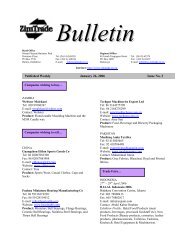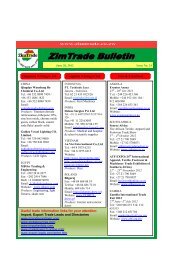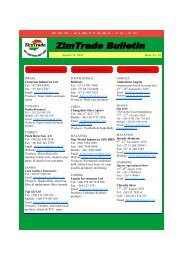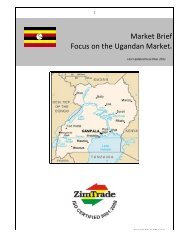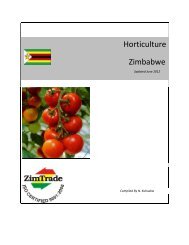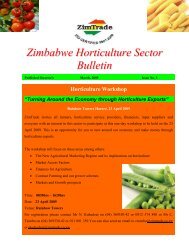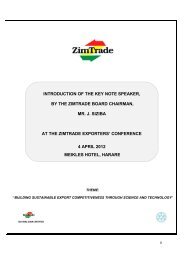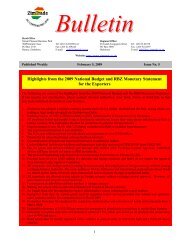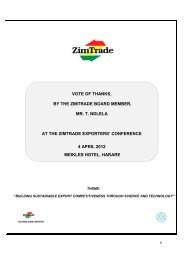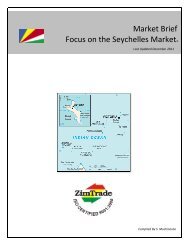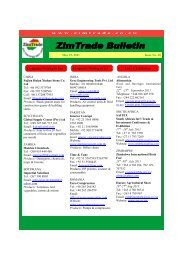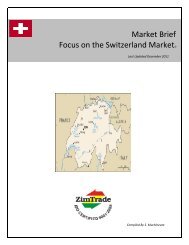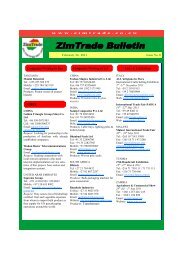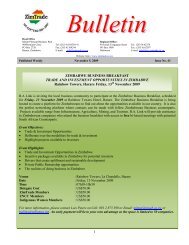ZimTrade June 2011 Newsletter
ZimTrade June 2011 Newsletter
ZimTrade June 2011 Newsletter
- No tags were found...
You also want an ePaper? Increase the reach of your titles
YUMPU automatically turns print PDFs into web optimized ePapers that Google loves.
<strong>Newsletter</strong><strong>June</strong> <strong>2011</strong>Head OfficeVol. 13 Issue No. 6Mount Pleasant Business Park Mobile: +263 773 584 261 Regional Office:904 Premium Close Tel: +2634 369330-41, 2918229 48 Josiah Tongogara Street Tel: +263 9 62378, 66151P.O. Box 2738 Fax: +263 4 369244 P.O. Box 3090 Fax: +263 9 62397Harare E-mail: info@zimtrade.co.zw BulawayoWebsite: http://www.zimtrade.co.zwAsia Market Access Requirements: Wet Blue LeatherAccording to the International Trade Centre (ITC)market analysis tool, the Trade Map(www.trademap.org), Asian imports of Bovineleather (wet blue – HS 4104) amounted toapproximately 52.3% of world imports in 2010.The major suppliers of leather to the Asian marketinclude Brazil, Argentina, USA and Mexico. Asiais experiencing a growing demand for raw hidesand skins as well as wet blue because of the hugeleather manufacturing taking place there.Leather manufacturers from the developedcountries are shifting production to Asiancountries especially East Asia and chiefly, Chinadue to stricter environmental norms in thedeveloped world as well as the pull factor oftechnological advancements and lower labor costsin Asian countries. Examples of companies thathave moved their production to Asia include,Leather Italia USA, Universal, Collezione,Europa, Craftmaster and DeCoro. All these arecompanies Headquartered in either Europe orAmerica.African countries have found it easier to meet theleather demands of the Asian leathermanufacturing sector than to attempt to supplythose markets with finished products. Tariffslevied on wet blue average between 5% - 10%depending on the import country. Zimbabwe has ahuge supply of raw hides and skins that is lying inthe tanneries and not being totally absorbed by thelocal leather manufacturing companies. It istherefore imperative to have joint exportmarketing efforts by the government and privateplayers in the leather sector inorder to bring in themuch needed export revenue. In 2010,Zimbabwe’s top four importers of wet blue wereItaly, China, South Africa and Korea.With Asia, being a growing market for leather it isvital that players in the sector understand therequirements they have to fulfill for their leather toenter the Asian markets. Zimbabwe recently enacteda ban of raw hides and skins exports so as toencourage value addition and ensure an adequatesupply for the local market. However, players arepermitted to export leather as from the wet bluestage. The exportation of leather can only be doneunder relevant permit or license and support lettersfrom the Ministry of Agriculture or the National Parksand Wild Life Management and Allied IndustriesFederation of Zimbabwe (LAIFEZ), AgricultureMarketing Authority, Ministry of Industry andCommerce for letters.Japan and China market access requirements forleather:1I. The Domestic Animal Infectious DiseaseAct –Japan and China, require that leatherentering their territories have a properinspection certificate attached and aquarantine certificate is also (Cont… to nextpage)
<strong>June</strong> <strong>2011</strong>II.III.issued after inspection certifying that theleather has no possibilityof spreading any causative agent of aninfectious disease. This requirement onlyapplies to leather not finished leatherproducts.Import License/ Notification - Before theproduct is allowed entry, an importnotification must be obtained from theintended destination, so that after theinspection, if the product is deemed ‘safe’,it is allowed to enter the markets. TheMinistries of Industry, Trade andCommerce in the destination countries canadvise on where these are obtained.Washington Convention/ CITESExporters need to understand the WashingtonConvention which classifies animals into threecategories of species. The three categories are:• All species threatened with extinction• All species requiring strictinternational regulation to preventdanger of extinction• All species which any party identifiesas being subject to regulation and asneeding the cooperation of otherparties in the control of trade.Commercial trade of animals in the first class is notpermitted, whilst commercial trade is permitted forthe other two classes provided a Certificate ofOrigin is attached.Under the Convention on International Trade inEndangered Species of Wild Fauna and Flora(CITES), the Foreign Exchange and Foreign TradeLaw regulates imports of species of wild fauna andflora listed in the Convention 2. Leather of lizards,snakes and certain other animal species issometimes subject to provisions of this Convention.It can be difficult to determine whether leathersunder its common name correspond to a speciescovered under CITES, or whether the material camefrom animals that stem from captive breeding.Trading with China is difficult because of thelanguage barrier. In some cases, the Chineseauthorities may require certain information on theimports to be submitted in their language, hence, itis advisable to seek the services of an agent based inthat country, someone who understands the culture,language and systems there.Sources: An article modified from the SADC Leather Information Brief & the following websiteswww.daff.gov.za; www.sinoleather.com & www.eacexport.com.*******************************************Hot Exporting Tips!• Half of your research work can be done right at home by surfing the web.• Market analysis is fundamental. Go to the target market and talk to people to understand your market.• When estimating the time it will take you to get export ready, double the figure.• The best source for distributors is the marketplace. A lot of good distributors are not even listed indirectories. You should talk to people locally. Trade commissioners can also supply names.• It pays to hire someone in the target country who understands the regulations of that country.• Often the best indication of your company’s potential for success abroad is to export your product orservice to other provinces first. If business is good across Zimbabwe, you’re in good shape.• Consider hiring international trade consultants who have experience to deal with the lack of managementtime.• Exports are not a part- time, “fringe” activity, but should be part of your company’s mainstream businessactivities.• Having someone within your company who speaks the language of the target country is a big asset.2
<strong>June</strong> <strong>2011</strong>Competitiveness through Food Safety Management- ISO 22000There has been growing consumer demand worldwide for safer food which leads to the proliferation ofnational food safety standards. In an effort to harmonize existing national food safety standards, InternationalStandards Organization (ISO) developed and published the ISO 22000 international standard on Food SafetyManagement Systems for any organization in the food chain, in September 2005.This standard defines the requirements of a Food Safety Management System covering all organizations in thefood chain from farmers to catering, including packaging. The standard combines generally accepted keyaspects of food safety at all stages of the food chain, including communication, system management, hazardcontrol and continual improvement of the management system.The process approach and continual improvement of ISO 22000 was derived from the ISO 9001 qualitymanagement system standard and ISO/TS22004 points out that ISO 22000 was designed to work in harmonywith ISO 9001:2000 and its supporting standards. In addition, this standard is a combination of two systems,which makes it easier for companies that are certified to 9001 and HACCP to become ISO 22000 certifiedbecause they already have a working system in place.Food Safety Management Systems (ISO 22000) is a functional system that guarantees safe food rightthrough the food value chain. It assists through:• Identifying food safety hazards that are expected to occur for the food type/ industry.• Assessing the risk of identified hazards in the context of the organization’s Food Safety ManagementSystem (FSMS).• Assessing the effectiveness of methodologies to control food safety hazards.• Identifying all integrated programs and procedures used by the organization to achieve food safetyobjectives.• Determining the adequacy and effectiveness of a food safety program.The following are some of the benefits of being ISO 22000 certified;• It removes Non Tariff Barriers to trade regarding food safety• Producing and supplying health quality food• Guaranteed food security to the nation• Facilitate traceability in food supply chains• Reduce food infection and intoxication, the likes of bacterial food-borne illness Staphylococcus andClostridium botulinum, Salmonella, Campylobacter, E. coli and Listeria bacteria in food cause foodinfection, to mention a few.<strong>ZimTrade</strong> wishes to advice companies involved in food value chain to be ISO 22000 certified in line withinternational standards. For more information regarding this standard and many more visit www.iso.org or anynearby SAZ office.4
<strong>June</strong> <strong>2011</strong>Why Businesses in Zimbabwe Must Engage in E-commerceE-commerce or electronic commerce is the buying and selling of goods and services and the transfer of fundsthrough digital communications. Business transactions are carried out over the internet with the assistance ofcomputers which are linked to each other forming a network.There are many different benefits to companies and businesses of engaging in e-commerce. These include thefact that it allows people to carry out business transactions without the barrier of time or distance. One can logon to the internet at any time of day or night and buys or sells anything at a single click of a mouse. The directcosts of an order taken from the internet is lower than through traditional means that is, retail paper basedtransactions there is no human interaction during the online electronic purchase order process. Also electronicselling is faster and more convenient for the visitor.E-commerce is also ideal for niche products as customers for such products are few and may be spread all overthe world. Other benefits of e-commerce are that it provides a larger marketplace with no geographicallimitations and customers can easily select products from different providers without moving aroundphysically, hence costs are reduced. Also, sales potential is increased leading to increased productivity. Theresponse to enquiries and queries is also faster and customer service is improved.Despite these many advantages, businesses in Zimbabwe and in other developing countries have not realisedfull benefits from e-commerce and continue to face challenges. E-commerce growth in these countries hasbeen slow for a variety of reasons including low levels of internet penetration and limited communicationinfrastructure. As a result, many people are still unaware of the opportunities offered by ecommerce. Much stillneeds to be done to encourage e-commerce in these countries. Key steps include the rapid development ofhuman resources, greater attention paid to e-literacy among citizens and activities to build capacity,particularly to provide a skills base among Small to Medium Enterprises (SMEs) for e-commerce.Governments in developing countries should encourage business start-ups and incubation projects that advancethis activity, including through public-private partnerships (PPPS), and to pay particular attention to gettingwomen engaged in e-enterprises. The Government of Zimbabwe through the Ministry of Information andCommunication Technology continues to encourage businesses to invest in e-commerce in order to enhancetheir businesses. The adoption of the multiple currency system in 2009 also presented a strong opportunity forthe growth of e-commerce in Zimbabwe and a chance to catch up with the rest of the world in this sector.According to online firm ZOLife, estimates indicate that 85% of the world’s internet users have carried outonline transactions as the amount of global trade conducted electronically has grown beyond expectations withwidespread internet usage. The company said as bandwidth costs decreased and internet usage improved inZimbabwe, e-commerce would become an important part of the economy.Sources: http://EzineArticles.com/ (The Standard of 5 <strong>June</strong> <strong>2011</strong>)5
<strong>June</strong> <strong>2011</strong><strong>ZimTrade</strong> DirectoriesExport Directory of Zimbabwe & Zimbabwe Services Sector Directories for <strong>2011</strong>Now Available!The hard copies and the CD versions of the Export Directory of Zimbabwe and the Zimbabwe Services SectorDirectories <strong>2011</strong> editions are now available at <strong>ZimTrade</strong> offices in Harare and Bulawayo.The directories are a compilation of information on diverse sectors of the Zimbabwean economy, names andcontact details of Zimbabwean exporters, trade related organizations, diplomatic missions accredited toZimbabwe and Zimbabwe’s representative offices in other countries.They serve as a reference point for companies and individuals interested in doing business with Zimbabwe.They also facilitates contacts between exporters and importers with their counterparts around the world,allowing the international community to contact Zimbabwe with ease.<strong>ZimTrade</strong> distributes copies of the directories to diplomatic missions in Zimbabwe, Zimbabwe Embassiesabroad, trade promotion bodies, and Chambers of commerce and Government Ministries. These bodies interactwith a number of international business establishments and therefore have a strategic position that allows themto facilitate business linkages of Zimbabwean and foreign companies.These publications provides an opportunity to companies to increase company visibility through placingadvertisements to showcase their products and services.***********************************************Frequently Asked QuestionsQ1. What is product/service certification?A. Certification is a written assurance by a third party that a product or service conforms to specificrequirements.Q2. What is the product/service Certification process of ISO 22000?A. The ISO 9001 and 22000 certification process is outlined as follows:1. Application2. Contract3. Stage 1 (Documentation) Audit4. Stage 2 (Certification) Audit5. Issuing of certicate6. Continuing management systems audits7. Recertifiation after 3 years.Q3. What are the support services offered by SAZ towards ISO 9001 and 22000 certification?A. Standard Sales- Located at every SAZ Branch there is an information division where ISO 9001 and22000 standards can be purchased or borrowed.Training- Based on specific needs of companies and driven by market demands, SAZ offers agrowing programme of well researched and relevant standards-based training programmes in order topromote an understanding of standards requirements and implementation.6
<strong>June</strong> <strong>2011</strong>SAZ Invites Companies for SADC Annual Quality AwardsThe Standards Association of Zimbabwe (SAZ) is inviting companies to submit entries for the SADC AnnualQuality Awards.This comes at a time when Zimbabwe is forging ahead to monitor identified technical barriers to trade throughthe recently launched National Technical Barriers to Trade (TBT) Committee. Subcommittees operating underthe National TBT Committee include the Standards, Quality Assurance and Metrology (SQAM) Committeewhich focuses on raising awareness of standards, quality assurance, accreditation and metrology.Zimbabwe will for the first time be running the National Annual Quality Awards (NAQA) under the auspicesof the SADC/SQAM.The inaugural national event is being organized by the National SQAM Committee which is represented by theStandards Association of Zimbabwe (SADCA/SADCSTAN), SIRDC (SADCMET), Ministry of Industry andCommerce (Trade Measures/ SADCMEL) Medicines Control Authority of Zimbabwe(SADCTRLC/SQAMEG) and NLAZ (SADCTBTSC) which form an integral part of the national qualityinfrastructure amongst others. This event comes at a critical point in history when the country is workingtowards social transformation and building a positive image.The aim of this competition is to recognize and appreciate organizations and individuals who are contributingto quality advancement in all sectors of Zimbabwe, by having measurement and quality systems, proceduresand processes that are in line with local, regional and international practices and who use quality advancementto support national and regional economic development and growth.Entries open on 8 <strong>June</strong> <strong>2011</strong> and close on 30 July <strong>2011</strong> under five categories:· CATEGORY 1- Company of the Year· CATEGORY 2- Product of the Year· CATEGORY 3 – Service of the Year· CATEGORY 4 - Exporter of the Year· CATEGORY 5 – SADC/SQAM Individual Award of the YearIn the first four categories, two awards per category are available:· One for the small and medium enterprises (SME)’s with less than 100 employees, and;· One for organizations with more than 100 employees – large enterprises (LE)The fifth category is an individual award. The competition is open to all Zimbabwean companies andindividuals who feel that they are contributing towards quality advancement in the country.The winners of the national competition will automatically qualify for the SADC Annual Quality Awards andwinners will be announced in February 2012.For any queries pertaining to the awards, kindly contact Clara Kabade on the details below:Standards Association of Zimbabwe (Borrowdale), Telephone: 263-4-885511/2 Direct: +263-4-885518Cell: +263 0772265494, Fax: 263-4-882020 or visit www.saz.org.zw7
<strong>June</strong> <strong>2011</strong>From the statistical figures above, the balance oftrade is in favour of South Africa in 2009 and 2010by $3 440 176 169.05 and $591 100 938.45,respectively. Zimbabwe’s exports to South Africaincreased by 16.5% between 2009 and 2010, itsimports decreased by 127.8% during the sameperiod. This development might be a result ofimport substitution by local firms.Investment opportunitiesAgro-Processing IndustryThe sector contributes about 4.7% of SouthAfrica’s exports. The South African agri-foodcomplex has a number of competitive advantagesderived from the use of high technology equipmentand machines. This makes it a vital trading andinvestment partner.Automotive and components IndustrySouth Africa’s automotive industry is a regionalengine for the manufacture and export of vehiclesand components. The sector is characterized by theuse of the state of the art technology and a welldeveloped infrastructure.Chemicals and PlasticsSouth Africa is among the top 25 chemicalproducingcountries in the world. This sector hasthe highest concentration of value-added output inSouth Africa and is the fourth-largest employer inthe manufacturing segment.Business OpportunitiesThe following companies in South Africa wish tobuy from Zimbabwe:Aton Blu Trading International (Pty) LtdTel: +27 11 234 7442/ 777 2056Email: info@atonblu.co.zaProducts: TomatoesExport & Import MovementTel: +27 12 386 2493, Mobile: +27 83 702 3786,Email: anverosman@gmail.comRequest: Looking for farming projects to invest inas well as contract farming for horticulture andother cropsF & M Import and ExportTel: +27 76 436 5246Email: miningco2008@gmail.comProducts: Cashew nuts, cotton seed & sugar caneDenmar EstatesTel: +27 58 303 2149Email: grahame.osler@denbi.comProducts: Exotic vegetables such as mange tout,sugar snaps, baby cornAnimal Feed Manufacturers AssociationTel: +27 12 663 9097Fax: +27 12 663 9612Email: admin@afma.co.zaWebsite: www.afma.co.zaProduct: Animal feed**************************************************Specials! Specials! Specials!<strong>ZimTrade</strong> PublicationsPublicationExport Directory of Zimbabwe <strong>2011</strong>Zimbabwe Services Sector Directory <strong>2011</strong>Guide to Zimbabwe’s Trade AgreementsNew Exporter’s GuideGuide to Importing in ZimbabweGuide to Developing An Export Marketing PlanCertificates Of OriginSADC & COMESA :- <strong>ZimTrade</strong> MembersNon-MembersPrice US$151513131354 per set5 per set9
<strong>June</strong> <strong>2011</strong>TRADE FAIRSAFRICA…..ANGOLAFILDA19 th -24 th July <strong>2011</strong>Tel: +244 917 654 000 /405970Fax: +244 222 862 161Email: feiras@fil-angola.co.aoWebsite: www.fil-angola.co.aoAngola Women Fair15 th -18 th September <strong>2011</strong>Tel: +244 926 405 978Fax: +244 222 862 161Email: yasmin.atun@filangola.co.ao;Yasmin.atun.fil@gmail.comAlimenticia(Food and BeveragesInternational Fair)22 nd -25 th Sept <strong>2011</strong>Tel: +244 926 405 978Fax: +244 222 862161Email: yasmin.atun@filangola.co.ao;Yasmin.atun.fil@gmail.comEXPOTRANSAngola Logistics andTransportation Fair24 th -27 th November <strong>2011</strong>Tel: +244 926 405 978Fax: +244 222 862161Email:yasmin.atun@fil-angola.co.ao;Yasmin.atun.fil@gmail.comMOZAMBIQUEMaputo International TradeFair29 th Aug-4 th Sept <strong>2011</strong>Tel: +258 1 427 151Fax: +258 1 427 129Email: sogex@tvcabo.co.mz;Website: www.facimfair.comNAMIBIAWindhoek Industrial AndAgricultural Show <strong>2011</strong>23 th Sept-1 st Oct <strong>2011</strong>Tel: +264 61 224748Fax: +264 61 227707Email:wssexpo@iafrica.com.naWebsite:www.windhoekshow.naSOUTH AFRICAAfrica's Big Seven Exhibition17 th –19 th July <strong>2011</strong>Tel: +27 11 783 7250Fax: +27 11 783 7269Email:admin@exhibitionsafrica.comWebsite:www.exhibitionsafrica.comSAITEXSouth African Int’l Trade &Investment Conference &Exhibition17 th –19 th July <strong>2011</strong>Tel: +27 11 783 7250Fax: +27 11 783 7269Email:admin@exhibitionsafrica.comWebsite:www.exhibitionsafrica.comSOUTH SUDANEast African Trade fair8 th -14 th July <strong>2011</strong>Tel: +249 9256 18934/937Mobile: +249 925618934/937/9554 42507Email:zimconsulate@yahoo.comTANZANIATanzania International TradeExpo1 st -5 th July <strong>2011</strong>Tel: +255 22 2850238Fax: +255 22 2850239/539Email: betis@intaafrica.comWebsite: www.bet.co.tzZAMBIAZambia Agriculture &Commercial Show28 th Jul – 1 st Aug <strong>2011</strong>Tel: +260 1 253426/ 415Fax: +260 1 254898Email: acsz@zarnet.zmWebsite: www.acsz.co.zmZIMBABWEHarare Agricultural Show19 th -27 th Aug <strong>2011</strong>Tel: +263 4 780963-6Fax: +263 4 780967Email:exhibitionpark@zas.co.zwWebsite: www.zas.co.zwZimbabwe InternationalBook Fair25 th -30 th July <strong>2011</strong>Tel: +263 4 702104, 702129,707352Email: events@zibfa.org.zw;zibfa@yahoo.comManicaland AgriculturalShow29 th Sept -2 nd Oct <strong>2011</strong>Tel: +263 2060804/63053/65463Email: exbpark@zol.co.zwWebsite: www.zas.co.zw***********************************************************************************************************************************11
<strong>June</strong> <strong>2011</strong>INTERNATIONAL…CHINA11th Shanghai Artworks &Antiques Expo3 rd - 6 th October, <strong>2011</strong>Tel: +86 21 58217409Fax: +86 21 58513862Mobile: +86 138169 96150Email:13816996150@126.comWebsite: www.aiccexpo.cnINDIAIndian Fashion Jewellery &Accessories Show (IFJAS)8 th – 10 th July <strong>2011</strong>Fax: +91 11 261 35518 / 19Email: ifjas<strong>2011</strong>@epch.comITALYMIPELInternational Leather Fair18 th -21 th September <strong>2011</strong>Tel: +39 02 584 511Fax: +39 02 584 51320Email: segreteria@mipel.itWebsite: www.mipel.comSAIEInternational BuildingExhibition5 th -8 th October <strong>2011</strong>Tel: +39 02 7259 4280Fax: +39 02 7259 4295Email: made@madeexpo.itWebsite: www.madeexpo.it75 th Fiera Del LevanteInternational General TradeFair10 th -18 th September <strong>2011</strong>Tel: +39 080 536 6111Fax: +39 080 536 6486Email: info@firenzefiera.itWebsite:www.fieradellevante.itPAKISTAN8 th Edition of the Int’l Plastic& Packaging IndustrialExhibition27th - 29 th September <strong>2011</strong>Tel: +92 21 1115 47687Fax: +92 21 3454 9986Email: k@kgroup.com.pkWebsite: www.kgroup.com.pkNETHERLANDSHortiFair1 st -4 th November, <strong>2011</strong>Tel: +31 297 344 033Telefax: +31 297 326 850Email: info@hortifair.nlWebsite: hortifair.comPAKISTANInt’l Housing, Real Estate &Construction Industry Show13 th -15 th September <strong>2011</strong>Tel: +92 21 111 222 444/34536321Fax: +92 21 3453 6330Email: info@ecgateway.netWebsite: www.ecgateway.netwww.buildasia.netInt’l Information Technology& Telecom Show20 th -22 nd September <strong>2011</strong>Tel: +92 21 111 222 444/34536321Fax: +92 21 3453 6330Email: info@ecgateway.netWebsite: www.ecgateway.netwww.itcnasia.com***********************************************************************************************************************************Published monthly by:Disclaimer: <strong>ZimTrade</strong> thrives for reliable, research-based information that is passed on to our readers in good faith. However, <strong>ZimTrade</strong> doesnot accept any responsibility for the accuracy of the information supplied, nor does it guarantee the status or reliability of any third partyincluded in the <strong>Newsletter</strong>. Similarly opinions expressed by third parties in abstracts and/or interviews are not necessarily shared by<strong>ZimTrade</strong>.12
<strong>June</strong> <strong>2011</strong>



